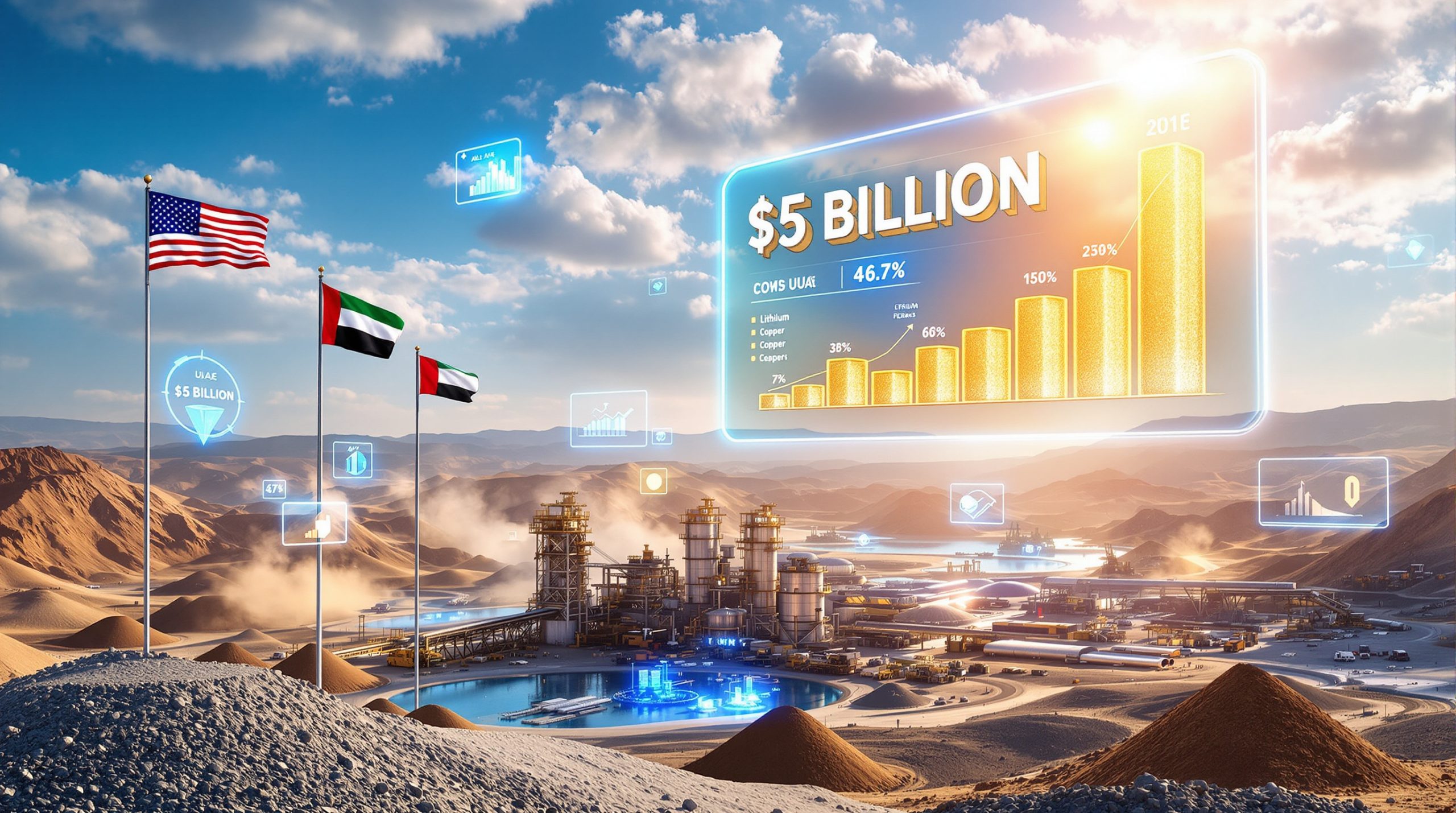Malaysia's Rare Earth Export Ban: Strategic Implications for Global Supply Chains
Malaysia has taken a decisive step in reshaping global rare earth supply chains with its announcement of an export ban on unprocessed rare earth minerals starting August 2023. This strategic move positions the Southeast Asian nation as an increasingly important player in critical mineral markets while potentially disrupting established supply channels. The policy reflects a growing trend of resource-rich nations seeking to capture more value from their natural resources while leveraging their position in critical minerals energy security.
How Is Malaysia Positioning Itself in the Global Rare Earth Market?
Malaysia's New Export Restrictions Explained
Malaysia's ban specifically targets unprocessed rare earth minerals while allowing processed rare earth metals to continue flowing to international markets. Announced by Minister Tengku Zafrul Abdul Aziz, the policy aims "to keep supplies onshore for investment in downstream industries," according to statements reported by the Malay Mail.
The policy establishes clear conditions for foreign investors interested in participating in Malaysia's rare earth sector. Companies must commit to:
- Local mineral processing operations
- Creating jobs for Malaysian workers
- Transferring valuable technology to build domestic capabilities
This approach represents a deliberate strategy to move up the value chain rather than simply exporting raw materials. By requiring processing to occur domestically, Malaysia aims to capture more economic value from its natural resources while developing technical expertise in the strategically important rare earth sector.
Malaysia's Current Position in Global Rare Earth Supply Chains
Malaysia already handles approximately 12-15% of global rare earth element processing, giving it a significant foundation upon which to build its strategic ambitions. The Lynas rare earth processing facility in Pahang represents the cornerstone of the country's current processing capacity.
"Malaysia's existing capabilities give it a head start in integrating into global supply chains," notes Qarrem Kassim, analyst at the Institute of Strategic & International Studies Kuala Lumpur. The country currently plays an important role in early-stage processing but has limited capabilities in the separation and purification stages—processes still dominated by China.
Malaysia's geographic position in Southeast Asia provides logistical advantages for serving both Asian and Western markets, a factor that could prove increasingly valuable as supply chains reconfigure in response to geopolitical tensions.
Why Are Rare Earth Elements So Strategically Important?
Critical Applications Driving Global Demand
Rare earth elements serve as essential components in numerous high-tech applications despite their relative obscurity among mainstream commodities. These elements are crucial for:
- Permanent magnets used in electric vehicles and wind turbines
- Precision optics and specialized glass for high-tech applications
- Catalysts for petroleum refining and automotive catalytic converters
- Military hardware including guidance systems, radar, and night vision equipment
- Smartphones, computers, and other consumer electronics
The unique properties of rare earths—including magnetic, luminescent, and electrochemical characteristics—make them difficult to substitute in many applications, contributing to their strategic importance. As clean energy technologies expand, demand for specific rare earths like neodymium and dysprosium continues to grow.
Global Supply Chain Vulnerabilities
China dominates the process of separating and purifying rare earth ores, creating a significant bottleneck in global supply chains. This concentration of processing capacity represents a strategic vulnerability for many technology-dependent economies, particularly as trade tensions between major powers increase.
The rare earth market has experienced significant volatility in the past, with price spikes following China's temporary export restrictions in 2010-2011. This historical precedent has motivated many countries to pursue supply chain diversification, with Malaysia now leveraging its position to potentially become an alternative processing hub.
The technical complexity of rare earth processing—involving challenging chemical separation processes and potential environmental impacts—creates significant barriers to entry for new market participants, further entrenching existing supply vulnerabilities.
What Motivates Malaysia's Strategic Shift in Rare Earth Policy?
Economic Development Objectives
Malaysia's rare earth export ban reflects a deliberate economic development strategy focused on higher-value industries. By requiring domestic processing, the country aims to:
- Develop advanced manufacturing capabilities in strategically important sectors
- Create higher-skilled and better-paying jobs for Malaysian workers
- Attract foreign investment while ensuring technology transfer
- Establish a more diversified economic base less dependent on raw material exports
The downstream rare earth industries Malaysia hopes to foster include advanced materials manufacturing, component production for clean energy technologies, and potentially even consumer electronics assembly—all representing higher-value activities than simple resource extraction. This approach aligns with broader mineral beneficiation opportunities seen in various resource-rich nations.
Geopolitical Considerations
"Applying this export ban equally to all sides is a signal that Malaysia is willing to exercise its geoeconomic agency to prioritise its own development needs. This may result in potential foreign investment down the road," explains Qarrem Kassim from the Institute of Strategic & International Studies Kuala Lumpur.
Malaysia's policy reflects a balancing act between maintaining relationships with China—the dominant player in rare earth processing—while simultaneously positioning itself as a potential alternative supplier for Western nations seeking supply chain diversification.
By establishing itself as a processing hub for rare earths, Malaysia gains strategic leverage in regional economic diplomacy, particularly as various nations compete for access to critical minerals essential for technological advancement and energy transition.
How Might This Impact Global Rare Earth Supply Chains?
Opportunities for Foreign Investment
Malaysia's policy creates both opportunities and imperatives for foreign investors in the rare earth sector. Companies seeking to secure rare earth supplies from Malaysia must now:
- Establish processing facilities within Malaysian borders
- Create employment opportunities for local workers
- Transfer technological know-how to develop domestic capabilities
For companies already invested in rare earth supply chains, this represents a potential opportunity to secure preferential access to raw materials by meeting Malaysia's requirements for local investment. Early movers may gain advantages in securing permits, building relationships with regulators, and establishing supply chain infrastructure.
The policy could attract interest from various international players including:
- Japanese technology firms seeking to reduce dependence on Chinese supplies
- Western mining companies looking to vertically integrate their operations
- Electronics manufacturers wanting to secure supply chain resilience
- Investment groups targeting critical minerals as strategic assets
Challenges for International Buyers
US buyers of rare earth metals, already "scrambling for non-Chinese sources" according to market observers, face additional complexity with Malaysia's policy shift. In the short term, the ban could potentially:
- Create temporary supply disruptions as supply chains adjust
- Increase costs for companies unprepared to invest in Malaysian processing
- Accelerate diversification efforts already underway
- Influence pricing dynamics in global rare earth markets
Companies heavily reliant on Malaysian rare earth exports may need to quickly develop alternative sourcing strategies or commit to investments that meet Malaysia's new requirements. This adaptation will likely occur at different speeds across industry sectors, potentially creating competitive advantages for more agile firms.
What Does This Mean for US-China Trade Relations?
US Efforts to Diversify Rare Earth Supplies
The United States faces particular challenges in rare earth supply security given its technological requirements and strained relationship with China. Malaysia's export ban creates both complications and opportunities for US diversification efforts.
American firms and policymakers have already been working to:
- Develop domestic mining and processing capabilities
- Secure supplies from allied nations with rare earth resources
- Invest in recycling technologies to recover rare earths from electronic waste
- Research alternative materials that could reduce dependence on specific rare earths
Malaysia's policy could accelerate US investment in Malaysian processing facilities as a means of securing supply chain diversity, potentially creating new channels for technology cooperation between the two countries.
China's Position in the Rare Earth Market
China's dominance in rare earth processing represents decades of strategic investment and policy support. While Malaysia's ban creates potential competition in the processing sector, China maintains significant advantages:
- Extensive experience in complex separation and purification techniques
- Integrated supply chains from mining through manufacturing
- Economies of scale across the rare earth value chain
- Research expertise in rare earth applications and processing technologies
How China responds to Malaysia's policy shift could significantly influence the effectiveness of Malaysia's strategy and its impact on global markets.
How Does Malaysia's Ban Compare to Other Countries' Resource Policies?
Global Trends in Resource Nationalism
Malaysia's approach follows a broader trend of resource-rich nations implementing policies to capture more value from their natural resources. This strategy shares similarities with:
- Indonesia's export ban on unprocessed nickel, which successfully attracted significant downstream investment
- Australia's emphasis on developing domestic processing capabilities for critical minerals
- Various African nations implementing local content requirements in mining contracts
These policies reflect a shift from the traditional resource extraction model toward more integrated development strategies that aim to create domestic industrial capabilities rather than simply exporting raw materials. Such approaches are increasingly common as countries implement export controls in resources to maximize domestic benefits.
Environmental and Sustainability Considerations
Rare earth processing presents significant environmental challenges, including:
- Management of radioactive byproducts from processing certain rare earth ores
- Chemical waste handling from separation processes
- Water usage and potential contamination concerns
- Energy intensity of processing operations
Malaysia's regulatory approach to these environmental considerations will significantly influence both the sustainability and public acceptance of its rare earth strategy. Balancing economic development goals with environmental protection represents a critical challenge for policymakers, particularly as the industry undergoes mining sustainability transformation.
What Are the Long-Term Implications for Global Rare Earth Markets?
Future Supply Chain Scenarios
Malaysia's policy shift could contribute to several potential long-term developments in global rare earth markets:
- Accelerated diversification of processing capacity beyond China
- Increased vertical integration among mining and technology companies
- Development of more sophisticated recycling capabilities
- Greater price transparency and potentially reduced volatility
- Emergence of new processing hubs in countries with rare earth resources
These developments will likely unfold gradually over years rather than months, as building processing capacity requires significant capital investment and technical expertise. The sector is also likely to benefit from evolving mining innovations that improve extraction efficiency and reduce environmental impacts.
Investment Opportunities and Risks
The changing landscape creates various investment implications across the rare earth value chain:
- Processing companies with transferable technology may find new opportunities in Malaysia
- Mining operations with unprocessed materials may face challenges without processing capabilities
- Equipment manufacturers specializing in processing technology could see increased demand
- Companies dependent on rare earth supplies may need to reconsider procurement strategies
For investors, understanding the technical complexities of rare earth processing and the geopolitical factors influencing market access will be crucial for evaluating opportunities in this evolving sector.
FAQ: Malaysia's Rare Earth Export Ban
What specific materials are covered by Malaysia's export ban?
The policy specifically targets "unprocessed rare earth minerals" while allowing "processed rare earth metals" to be exported. This distinction creates incentives for domestic processing while maintaining export channels for value-added products.
The 17 rare earth elements include:
- Light rare earths: lanthanum, cerium, praseodymium, neodymium, promethium, samarium, europium, and gadolinium
- Heavy rare earths: terbium, dysprosium, holmium, erbium, thulium, ytterbium, lutetium, scandium, and yttrium
The precise definition of "processed" versus "unprocessed" materials will likely be clarified through implementing regulations that define the minimum level of processing required before export.
How will this policy affect global electronics manufacturing?
Electronics manufacturers dependent on rare earth components may experience several impacts:
- Potential supply chain disruptions during the transition period
- Pressure to develop more diverse sourcing strategies
- Possible price fluctuations for specific rare earth elements
- Incentives to improve material efficiency and recycling capabilities
Companies with more flexible supply chains and those already pursuing diversification strategies will likely adapt more easily to the changing landscape.
Which companies are most affected by Malaysia's export ban?
The ban will have varying impacts across different sectors and companies:
- Current exporters of unprocessed rare earth minerals from Malaysia face the most direct impact
- Companies with existing processing facilities in Malaysia may gain competitive advantages
- Technology firms dependent on rare earth components may need to adjust procurement strategies
- Mining companies may find new opportunities to develop processing capabilities
The specific impact will depend largely on how companies respond to Malaysia's investment requirements and their ability to adapt supply chains to the new regulatory environment.
What environmental safeguards accompany Malaysia's rare earth strategy?
While Malaysia's policy announcement focused primarily on economic development objectives, the environmental dimension of rare earth processing remains critically important. Effective environmental management will likely require:
- Comprehensive regulatory frameworks for waste management
- Monitoring systems for potential environmental impacts
- Technical standards for processing facilities
- Transparency mechanisms to build public trust
Malaysia's experience with the Lynas facility provides valuable lessons for developing appropriate environmental safeguards for an expanded rare earth processing sector.
The Broader Significance of Malaysia's Rare Earth Strategy
Malaysia's policy represents more than just a technical change in export regulations—it signals a strategic repositioning in global mineral supply chains. By leveraging its existing processing capacity and geographic position, Malaysia aims to capture more value from critical minerals while potentially offering an alternative to China-dominated supply chains.
The success of this strategy will depend on numerous factors, including Malaysia's ability to attract investment, develop technical capabilities, manage environmental concerns, and navigate complex geopolitical currents. Regardless of the ultimate outcome, the policy highlights the growing strategic importance of rare earth elements in global technology competition and the increasing agency of resource-rich nations in shaping supply chain dynamics.
Want to Spot the Next Major Mineral Discovery?
Discover why major mineral discoveries can lead to significant market returns by exploring Discovery Alert's dedicated discoveries page, showcasing historic examples that have delivered exceptional outcomes to early investors. Begin your 30-day free trial today to receive real-time alerts on significant ASX mineral discoveries, powered by the proprietary Discovery IQ model.




